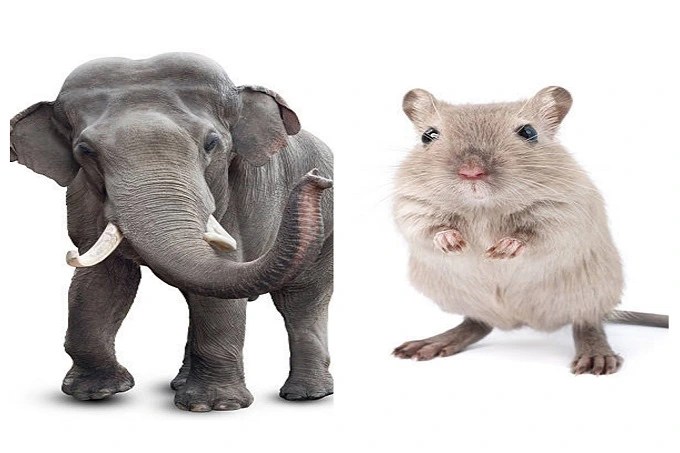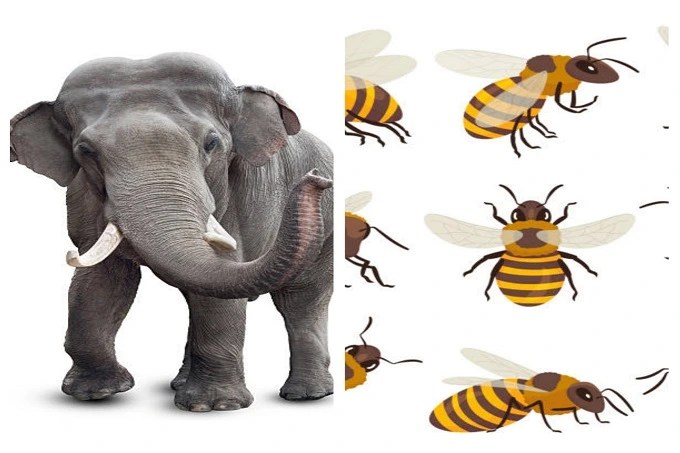Where did the idea that elephants are afraid of mice originate in the first place? It was about the year 77 AD that the Roman philosopher Pliny the Elder wrote about the unusual interaction between big-eared giants and mice in his Natural History book. People’s interest in the theory that elephants are afraid of mice gradually grew throughout the course of time. Fairy tales and animated animations started including many depictions of an elephant and a courageous rodent. In addition, the establishment of zoos and circuses paved the way for beginning research on the phenomena.
Why do elephants become afraid of mice?

Some people are under the impression that mice can squeeze their way into an elephant’s trunk and cut off its air supply. There is a theory that the rodent can bite at the soles of the animal while it is sleeping, which is why giant elephants are always seen sleeping in an upright position. Last but not least, it is often believed that elephants are easily terrified by the rustling sound that mice create.
Scientists on multiple occasions have investigated the question of whether or not elephants are actually afraid of mice. They have tried putting rodents on the trunk and placing them inside it, hiding them, and then suddenly releasing it. However, they have not been able to find any evidence that elephants are afraid of mice.
Richard Lair, a researcher at the Thai National Elephant Institute, is certain that even if a mice were to find its way inside the elephant’s trunk, the animal would simply be able to remove it. And to bite the soles. Why would you do that? In addition, elephants do not always sleep in the upright position.
2017, researchers from the University of the Witwatersrand in South Africa set out to determine how long they sleep while they are out in the wild. It was discovered that they need around two hours of rest to live a regular existence. They only do so approximately once every three or four days on average, and when they do, they stay in this position for about an hour. However, this behavior is also common in many other kinds of animals. In addition, if there are potential dangers in the area, such as humans, other animals, or loud noises, the herd may forego the opportunity to sleep to choose a more peaceful location. Joshua Plotnik, a researcher at the University of Cambridge, is likewise of the opinion that elephants are sensitive to noise. Because of this, anything other than the mice may also alarm and unnerve them.
In the American Circus of the Ringling brothers, Barnum and Bailey, in 2006, they sought an answer to why elephants are afraid of mice. Specifically, they were looking for an explanation for this phobia. The trainer tried to pique his charges’ interest in the mice he was using, but they were uninterested. Therefore, it was feasible to demonstrate that the contrary is true; the assertion is a myth.
Why are elephants scared of bees?

What kinds of dangers do elephants really face? In 2010, researchers from the University of Florida made a business trip to Kenya. While there, they observed African elephants steer clear of trees where ants had taken home. The researchers believe they are concerned about being bitten in the fragile mucous membrane that lines the trunk.
Fearful animals include elephants and bees. In 2018, researchers from Kruger National Park in South Africa discovered that elephants could pick up on the pheromones that angry insects release. Elephants have developed the ability to identify this odour. Therefore, they make every effort to avoid making eye contact. The researchers carried out an experiment in which a combination of pheromones was mixed in special matrices, inserted in socks, and then left along a path that elephants often travelled to reach a drinking hole. After taking in all the information, the animals tried their best to go as far away as possible. But even when placed next to the same socks, even without a matrix containing pheromones, they maintained their composure. Researchers in the field of biology have arrived at the same conclusion: the pain of the bite is what makes people afraid.
Many African farmers already use this information by positioning beehives near their crops. However, researchers are certain that using matrices that produce a fragrance is a method that is more cost-effective and requires fewer resources.
Many different hypotheses explain why elephants are afraid of mice. One popular explanation is that the mice may crawl inside their trunks or gnaw on their soles. Neither of those assertions, however, is supported by any evidence that can be found.
The researchers believe that elephants fear bees because they don’t enjoy having the soft tissue within their trunks and around their eyes stung, which is why they think elephants have this fear.
